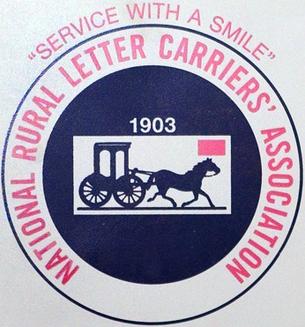
The United States Postal Service (USPS), also known as the Post Office, U.S. Mail, or Postal Service, is an independent agency of the executive branch of the United States federal government responsible for providing postal service in the United States, its insular areas, and its associated states. It is one of the few government agencies explicitly authorized by the Constitution of the United States. As of 2023, the USPS has 525,469 career employees and 114,623 non-career employees.
Canada Post Corporation, trading as Canada Post, is a Crown corporation that functions as the primary postal operator in Canada.
The Board of Governors of the United States Postal Service is the governing body of the United States Postal Service (USPS). The board oversees the activities of the Postal Service, while the postmaster general actively manages its day-to-day operations.

A mail carrier, also referred to as a mailman, mailwoman, mailperson, postal carrier, postman, postwoman, postperson, person of post, letter carrier, or colloquially postie, is an employee of a post office or postal service who delivers mail and parcel post to residences and businesses. The term "mail carrier" came to be used as a gender-neutral substitute for "mailman" soon after women began performing the job. In the Royal Mail, the official name changed from "letter carrier" to "postman" in 1883, and "postwoman" has also been used for many years.
Star routes is a term used in connection with the United States postal service and the contracting of mail delivery services. The term is defunct as of 1970, but still is occasionally used to refer to Highway Contract Routes (HCRs), which replaced the Star routes. The term is mostly used in connection with a series of scandals in the 1870s involving bribes to postal officials.

The National Association of Letter Carriers (NALC) is an American labor union, representing non-rural letter carriers employed by the United States Postal Service. It was founded in 1889. The NALC has 2,500 local branches representing letter carriers in all 50 states, the District of Columbia, Puerto Rico, the Virgin Islands and Guam.

John E. "Jack" Potter is the president and CEO of the Metropolitan Washington Airports Authority since July 18, 2011. He is the former United States Postmaster General and CEO of the United States Postal Service (USPS), having become the 72nd postmaster general on June 1, 2001. Potter is the second longest-serving postmaster general, following Gideon Granger.
The Canadian Union of Postal Workers is a public-sector trade union representing postal workers including letter carriers, rural and suburban mail carriers, postal clerks, mail handlers and dispatchers, technicians, mechanics and electricians employed at Canada Post as well as private sector workers outside Canada Post. Currently comprising upwards of 50,000 members, the Canadian Union of Postal Workers has historically been labeled as militant because of some of the actions undertaken since its inception in 1965 to help guarantee rights to all postal workers. According to former president Jean-Claude Parrot, "We succeeded to get the support of the membership because we earned our credibility with them...we got that reputation [of militancy] because we earned it."

Rural Free Delivery (RFD), since 1906 officially rural delivery, is a program of the United States Post Office Department to deliver mail directly to rural destinations. The program began in the late 19th century. Before that, people living in rural areas had to pick up mail themselves at sometimes distant post offices or pay private carriers for delivery.

The National Postal Mail Handlers Union (NPMHU) is a progressive labor union representing more than 50,000 Mail Handler craft members in United States Postal Service facilities across the United States.

The American Postal Workers Union (APWU) is a labor union in the United States. It represents over 200,000 employees and retirees of the United States Postal Service who belong to the Clerk, Maintenance, Motor Vehicle, and Support Services divisions. It also represents approximately 2,000 private-sector mail workers.

Rural letter carriers are United States Postal Service and Canada Post employees who deliver mail in what are traditionally considered rural and suburban areas of the United States and Canada. Before Rural Free Delivery (RFD), rural Americans and Canadians were required to go to a post office to get their mail.

The National Rural Letter Carriers' Association (NRLCA) is an American labor union that represents the rural letter carriers of the United States Postal Service (USPS). The NRLCA negotiates all labor agreements for the rural carrier craft with the USPS, including salaries, and represents members of the rural carrier craft in the grievance procedure. The NRLCA's stated goal is to "improve the methods used by rural letter carriers, to benefit their conditions of labor with the United States Postal Service, and to promote a fraternal spirit among its members."
William H. Young is an American labor union leader. He was president of the National Association of Letter Carriers (NALC) from 2002 to 2009 and also a vice-president of the AFL–CIO.

Patrick R. Donahoe is an American politician who served as the 73rd United States postmaster general, having been appointed to the post on October 25, 2010. A 35-year veteran of the Postal Service, he reported to the Postal Service Board of Governors.

The Stamp Out Hunger Food Drive is a charitable initiative conducted by the United States Postal Service, National Rural Letter Carriers' Association & National Association of Letter Carriers in the United States to make significant donations of food to organizations serving needy persons.
Mail Isolation Control and Tracking (MICT) is an imaging system employed by the United States Postal Service (USPS) that takes photographs of the exterior of every piece of mail that is processed in the United States. The Postmaster General has stated that the system is primarily used for mail sorting, though it also enables the USPS to retroactively track mail correspondence at the request of law enforcement. It was created in the aftermath of the 2001 anthrax attacks that killed five people, including two postal workers. The automated mail tracking program was created so that the Postal Service could more easily track hazardous substances and keep people safe, according to U.S. Postmaster General Patrick R. Donahoe.

Megan Jane Brennan served as the seventy-fourth Postmaster General of the United States. Brennan became the first woman to hold the office when she assumed the position on February 1, 2015.

Louis DeJoy is an American businessman serving as the 75th U.S. postmaster general. He was appointed in May 2020 by the Board of Governors of the United States Postal Service (USPS). Prior to the appointment, he was the founder and CEO of the logistics and freight company New Breed Logistics and was a major Republican Party donor and fundraiser for Donald Trump. DeJoy is the first postmaster general since 1992 without any previous experience in the USPS. His companies still hold active service contracts with the USPS, generating controversy over conflict of interest.

The Postal Service Reform Act of 2022 is a federal statute intended to address "the finances and operations of the U.S. Postal Service (USPS)", specifically to lift budget requirements imposed on the Service by the Postal Accountability and Enhancement Act and require it to continue six day a week delivery of mail.


















